Text
I guess that is when Eugène and Masséna began to have sour relations with one another? Or was there another event that cause this emnity to arise?
Not that I know of at least. I could very well imagine that people like Masséna, who had to claw their way up to the top, who had worked hard, risked life and limbs and merited their position simply because they were the best at their job, in general did not take kindly to whippersnappers like Eugène or Jérôme who owed everything they were to the fact their names were "Beauharnais" and "Bonaparte". How should somebody like Masséna, the victor of Zurich, take somebody like Eugène serious?
(And just to add: rightfully so. Even Eugène would have agreed with that attitude, he was extremely self-conscious when it came to the marshals, or to anyone who, unlike him, had taken part in the "glorious" campaigns of Austerlitz and Jena.)
As to the Northern Italy campaign of 1805 (battle of Caldiero etc), all I remember is that after the peace of Pressburg had been concluded, Napoleon wanted Eugène to demand war contributions in the newly acquired Venice region, to seize the coffers in certain towns etc. To which Eugène answered that, alas, this was not possible anymore, as the money had already been taken by Masséna and his chief-of-staff Solignac (whose love for looting was already noted by Desaix in 1797). That's what infuriated Napoleon enough to order Masséna to return the money.
I could very well imagine that Masséna was fuming about this arrogant brat, who owed his position to nepotism alone, having denounced him. On the other hand, Eugène had, for a very long time, a rather naive and chivalrous attitude about war. It was absolutely clear for him that both the enemy and especially civilians had to be treated fairly and kindly whenever possible, and Masséna violated that at every occasion. There's a funny exchange from that same war of 1809 with Napoleon, Napoleon basically reproaching Eugène for not having looted in the towns he had occupied 😁.
Duroc the mediator
Which, I believe, Duroc often was. This particular occasion however took place in 1809, and he acted as a go-between with Napoleon and Eugène, in April and May 1809, after Eugène’s defeat in his very first attempt as commander-in-chief, on April 16, at Sacile. Eugène was heartbroken over it and very afraid of Napoleon’s reaction to the news. Napoleon – full credit to him for once – originally kept his cool and in his first answer was not even very severe. He only became angry when Eugène’s reports, in his opinion, did not give him enough information on the situation.
And as usual, when he was really angry, he deemed the culprit unworthy of receiving a direct message. Or perhaps Duroc intervened voluntarily, in order to soften the blow? In any case, it was he who wrote the following missive:
Duroc to Eugène, Landshut, 26 April 1809
My Lord, the Emperor, who is extremely busy, is unable to reply at the moment to the two letters from Your Imperial Highness. - These two letters have not satisfied His Majesty, in that they do not give him any details of what has happened to your army, of its position, of its losses, so that he cannot give you any advice on the best course of action for Your Highness to take. The Emperor says: It is nothing but a lost battle, and there is a remedy for that; but he cannot tell you what that remedy is, because he does not know where you are or what forces you have. His Majesty knows Italy and all the positions so well that from here he could tell you the best position you could take for your army.
I am not entirely sure if Eugène really did not know how to write a proper battle/situation report, or if he was being evasive on purpose. I kinda suspect the latter, and so do apparently most historians, assuming that Eugène did not want to admit what mistakes he had made. That may very well be the case, but, Eugène being Eugène, I could also imagine two more reasons: a) he wanted to protect his subordinates and not give Napoleon the opportunity to look for somebody to put the blame on (as Napoleon later would start to do with general Sahuc) and b) he on pupose gave away as few details as possible because he did not want Napoleon to start micromanaging the Army of Italy from his headquarters in Germany. After all, it was he, Eugène, who had created this mess. It was up to him now to sort things out.
In a circumstance such as the one in which you find yourself, and in general in all circumstances of war, it would have been preferable if you had sent an officer who had seen everything clearly and who could have given an account of everything to His Majesty. A courier says nothing, not even the little he is told. His Majesty would therefore have liked a detailed report, he would have liked Your Imperial Highness to have had General Caffarelli write at the same time. His Majesty sees with sorrow that you are concerned with the Tyrol, where there are only a few troops who have fomented insurrections; but all these insurrections will subside, and the troops who have entered there are turned and taken, if they do not evacuate, as soon as the Emperor's army arrives in Salzburg, which cannot be far off. Here, matters are still going well. [...]
Followed by lots of reports about Napoleon beating the Austrians at every occasion. Thanks for rubbing it in, Duroc! - So, just to summarize, Eugène’s greatest fault in Napoleon’s eyes was not the fact that he had lost the battle but that he was sending his reports about it via courrier or by the army post office, instead of sending one of the officers.
As to Tyrol, that part of the letter will not age well…
With no better information incoming over the next days, or rather, as a matter of fact, with pretty much no information reaching Napoleon, despite Eugène writing every second or third day – which may in part very well be because the insurrection in Tyrol had interrupted communications – His Imperial Impatience was fuming. And it showed in his letters. In the last (that luckily only reached Eugène when it didn’t matter anymore), he openly praised both Masséna (whom Eugène despised) and Murat (whom he possibly despised even more) to the skies, going so far as to order Eugène to call Murat from Naples and to cede supreme command to Murat. The ultimate humiliation!
At that time, however, the situation in Italy had already changed completely. After Napoleon had beaten the Austrians in Germany, the Austrian archduke Johann had been recalled by his brother. The Austrians were retreating from Italy rather hastily, and the Army of Italy was pursuing them. In this situation, Napoleon’s brutal missives were not helpful at all.
At least that was what the above mentioned general Caffarelli thought, the minister of war of the Kingdom of Italy. And because he thought so, he wrote to … nah, not to Napoleon, of course. You can’t just write to a monarch, after all. He wrote to - Duroc. And after a short description of the situation and the difficulties they had overcome, he states:
Caffarelli to Duroc, Venice, 7 May 1809
[…] His Imperial Highness appeared to me to be greatly affected by the Emperor's discontent; he is extremely worried about it, the Prince suffers from it, and I could see that his grief comes more from his heart than from regret at having experienced an ill-fated affair. He needs to be reassured, because if he continues to believe that the Emperor is dissatisfied, he will suffer even more, he will torment himself and, despite the fine state in which His Majesty's victories have put matters, he might not be able to benefit as much as he could from the fine prospects open to him. He is in a position to repair, with interest, the harm he has suffered. […]
Ey! Can you not get him to back off a little? We’re in a good position and we need the boy functional, okay?
(Just to bring the story to an end: by the time Eugène had led his army through the Alps and reached Napoleon, his stepfather had already lost the battle of Aspern-Essling and had seen Lannes mortally wounded. Morale in his army was extremely low, and Napoleon’s tone when welcoming the Army of Italy was much different from that of his letters to Eugène.)
22 notes
·
View notes
Text
Duroc the mediator
Which, I believe, Duroc often was. This particular occasion however took place in 1809, and he acted as a go-between with Napoleon and Eugène, in April and May 1809, after Eugène’s defeat in his very first attempt as commander-in-chief, on April 16, at Sacile. Eugène was heartbroken over it and very afraid of Napoleon’s reaction to the news. Napoleon – full credit to him for once – originally kept his cool and in his first answer was not even very severe. He only became angry when Eugène’s reports, in his opinion, did not give him enough information on the situation.
And as usual, when he was really angry, he deemed the culprit unworthy of receiving a direct message. Or perhaps Duroc intervened voluntarily, in order to soften the blow? In any case, it was he who wrote the following missive:
Duroc to Eugène, Landshut, 26 April 1809
My Lord, the Emperor, who is extremely busy, is unable to reply at the moment to the two letters from Your Imperial Highness. - These two letters have not satisfied His Majesty, in that they do not give him any details of what has happened to your army, of its position, of its losses, so that he cannot give you any advice on the best course of action for Your Highness to take. The Emperor says: It is nothing but a lost battle, and there is a remedy for that; but he cannot tell you what that remedy is, because he does not know where you are or what forces you have. His Majesty knows Italy and all the positions so well that from here he could tell you the best position you could take for your army.
I am not entirely sure if Eugène really did not know how to write a proper battle/situation report, or if he was being evasive on purpose. I kinda suspect the latter, and so do apparently most historians, assuming that Eugène did not want to admit what mistakes he had made. That may very well be the case, but, Eugène being Eugène, I could also imagine two more reasons: a) he wanted to protect his subordinates and not give Napoleon the opportunity to look for somebody to put the blame on (as Napoleon later would start to do with general Sahuc) and b) he on pupose gave away as few details as possible because he did not want Napoleon to start micromanaging the Army of Italy from his headquarters in Germany. After all, it was he, Eugène, who had created this mess. It was up to him now to sort things out.
In a circumstance such as the one in which you find yourself, and in general in all circumstances of war, it would have been preferable if you had sent an officer who had seen everything clearly and who could have given an account of everything to His Majesty. A courier says nothing, not even the little he is told. His Majesty would therefore have liked a detailed report, he would have liked Your Imperial Highness to have had General Caffarelli write at the same time. His Majesty sees with sorrow that you are concerned with the Tyrol, where there are only a few troops who have fomented insurrections; but all these insurrections will subside, and the troops who have entered there are turned and taken, if they do not evacuate, as soon as the Emperor's army arrives in Salzburg, which cannot be far off. Here, matters are still going well. [...]
Followed by lots of reports about Napoleon beating the Austrians at every occasion. Thanks for rubbing it in, Duroc! - So, just to summarize, Eugène’s greatest fault in Napoleon’s eyes was not the fact that he had lost the battle but that he was sending his reports about it via courrier or by the army post office, instead of sending one of the officers.
As to Tyrol, that part of the letter will not age well…
With no better information incoming over the next days, or rather, as a matter of fact, with pretty much no information reaching Napoleon, despite Eugène writing every second or third day – which may in part very well be because the insurrection in Tyrol had interrupted communications – His Imperial Impatience was fuming. And it showed in his letters. In the last (that luckily only reached Eugène when it didn’t matter anymore), he openly praised both Masséna (whom Eugène despised) and Murat (whom he possibly despised even more) to the skies, going so far as to order Eugène to call Murat from Naples and to cede supreme command to Murat. The ultimate humiliation!
At that time, however, the situation in Italy had already changed completely. After Napoleon had beaten the Austrians in Germany, the Austrian archduke Johann had been recalled by his brother. The Austrians were retreating from Italy rather hastily, and the Army of Italy was pursuing them. In this situation, Napoleon’s brutal missives were not helpful at all.
At least that was what the above mentioned general Caffarelli thought, the minister of war of the Kingdom of Italy. And because he thought so, he wrote to … nah, not to Napoleon, of course. You can’t just write to a monarch, after all. He wrote to - Duroc. And after a short description of the situation and the difficulties they had overcome, he states:
Caffarelli to Duroc, Venice, 7 May 1809
[…] His Imperial Highness appeared to me to be greatly affected by the Emperor's discontent; he is extremely worried about it, the Prince suffers from it, and I could see that his grief comes more from his heart than from regret at having experienced an ill-fated affair. He needs to be reassured, because if he continues to believe that the Emperor is dissatisfied, he will suffer even more, he will torment himself and, despite the fine state in which His Majesty's victories have put matters, he might not be able to benefit as much as he could from the fine prospects open to him. He is in a position to repair, with interest, the harm he has suffered. […]
Ey! Can you not get him to back off a little? We’re in a good position and we need the boy functional, okay?
(Just to bring the story to an end: by the time Eugène had led his army through the Alps and reached Napoleon, his stepfather had already lost the battle of Aspern-Essling and had seen Lannes mortally wounded. Morale in his army was extremely low, and Napoleon’s tone when welcoming the Army of Italy was much different from that of his letters to Eugène.)
22 notes
·
View notes
Text
A couple of days ago I met a beautiful woman in the Moscow metro. She was holding a Starbucks cup in her hands, but inside there was not coffee, but earth and a few petals in it.
This looks absolutely like Josephine in modern AU. I’m sure she would also steal a sprout of a plant she liked from the cafe for her garden.

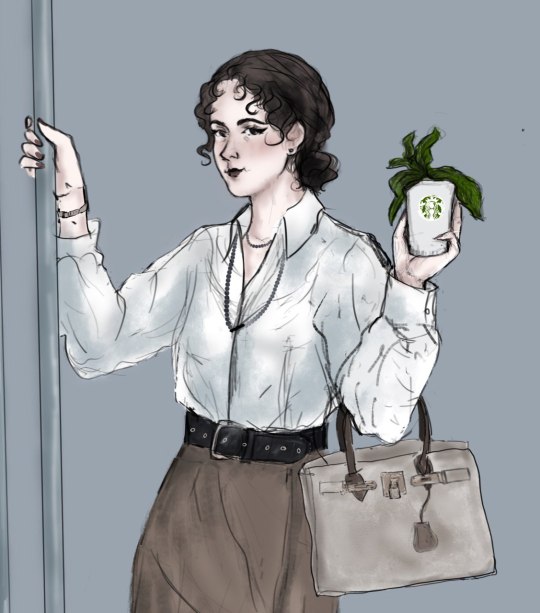
69 notes
·
View notes
Text
💖
Le fils.
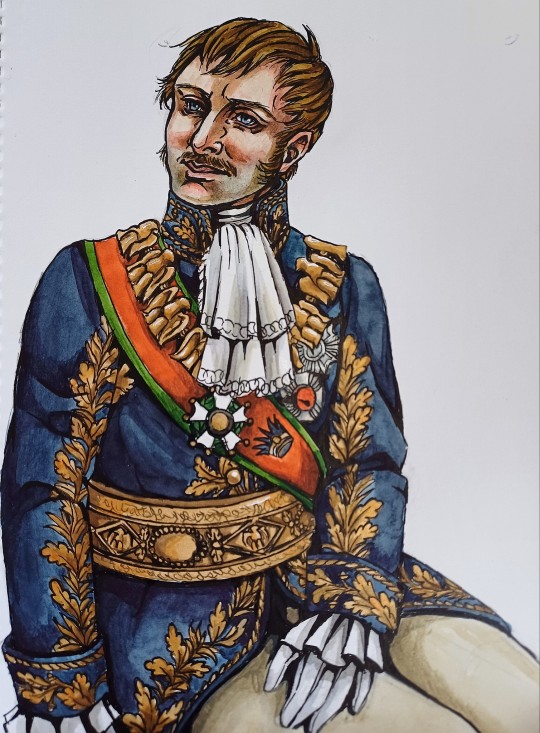
33 notes
·
View notes
Note
Sorry if you posted about it, but I just read a passing reference to Eugène de Beauharnais and the intricate and prolonged negations with the Swedes over the marriage of his eldest daughter Josephine and wondering if you have details on it?
Not at all, I'm afraid 😥. Adalbert in his biography of Eugène pretty much glosses over the details, and as negotiations for young Josephine's wedding coincide with the beginning of Eugène's fatal illness, they are only mentioned in passing.
Kérautret does give some more information: Bernadotte/Carl Johann apparently had only added Josephine von Leuchtenberg on his list of possible brides for Oscar at the last moment. Maybe as a last resort, if the other royal families were unwilling to marry one of their daughters to that upstart king? - In any case, she was technically not even an eligible bride, as she was not "of royal blood", her father now being a mere duke. So the Bavarians had to shuffle a lot of papers around and to at least ponder very loudly whether Eugène's family should be regarded as a side branch of the Wittelsbachs. They never were (Eugène's brother-in-law Ludwig saw to that) but it seems it sufficed for the Swedish public.
Another, but minor problematic point may have been Josephine's catholic faith. But these were modern times now, so it was nothing that could not be overcome.
Thanks for the Ask! 💖
5 notes
·
View notes
Note
Aaahhhh!!! I've been obsessing over it lately and I thank you for creating your blog, it's very informative! But I would like to know please how Murat got along with most of the Marshals, I also read that he got along well with Bessiéres, reply when you can!
Sorry for the late reply, I haven’t had energy for social media for the past month or so. Glad you’ve been enjoying the blog though!
As for Murat’s relationships with his fellow marshals, I think in general the tensions/conflicts he had with several of them have been overblown. I’ve written a bit about my view of his relationship with Lannes before (here, and a little follow-up here), and I still remain convinced that they were closer than the ongoing mainstream narrative based on dubious memoirs. Murat also butted heads with Ney on various occasions during campaigns, but I don’t believe there was any deep hatred between them or anything like that, and they got on well enough during the 1812 campaign and seemed pretty much on the same page. Oh, but Murat, Lannes, and Ney were all hanging out at Bareges together taking the waters when Murat found out he was going to be the new King of Naples, so there’s that.
Murat’s relationship with Berthier is interesting and I wish I knew more about it. Early on, Murat (who was pretty prone to paranoia) was convinced that Berthier was his enemy, as a result of Murat having been critical of him. But their relationship seems to have grown better over the years judging from some tidbits I came across in some of Berthier’s letters to Murat. Berthier also serves as kind of a go-between when Murat is in Naples and Napoleon wants to criticize him and needs someone to word it in such a way as to not wound Murat’s delicate feelings too deeply; he takes a much more gentler approach while still making sure Napoleon’s points get through to Murat.
Murat doesn’t seem to have gotten along very well with Soult, but I think @josefavomjaaga has posted more details on that on her page before, I really don’t know much about Soult in general.
Bessieres and Murat were supposedly good friends but it’s just another one of those things that unfortunately doesn’t have enough documentation on it one way or the other. Most of their correspondence I’ve ever comes across has been very formal and businesslike. It’s also hard to glean too much about Murat’s relationship with Bernadotte either. They had similar political views early in their careers, and Murat invited Bernadotte to his wedding (I’ve always wondered if it was just to spite Napoleon, who refused to attend), but also expressed criticism of Bernadotte in a letter to Joseph Bonaparte for having refused to side with the Bonapartes during the Brumaire coup. I really haven’t found much else about their relationship at all.
If there’s one marshal we can say for sure Murat absolutely did not like or get along with, it’s Davout. These two were just oil and water, unalike in pretty much every fathomable way. Their relationship got so bad during the 1812 campaign that Murat’s chief of staff had to physically restrain Murat from going out to either challenge Davout to a duel, or maybe just to shoot him on the spot (Murat had just grabbed his pistol and was on his way out of his tent). When Murat dared to speak against Napoleon for abandoning the army during the retreat and threatening to leave himself, Davout upbraided him for “black ingratitude”. I’ve never found exactly how Davout reacted to news of Murat’s defection in 1814, but it’s pretty easy to imagine.
Thanks for the ask!
#at least soult's adc's claim in their memoirs that soult detested murat#they surely did#plus being at odds with soult wasn't exactly hard 😁#that's the rule rather than the exception
37 notes
·
View notes
Text
LOL. I've just come across yet another article by André Gavoty in La Revue des Deux Mondes, issue of 1 December 1952, claiming that Eugène, on the day of the first Légion d'Honneur ceremony, when Soult's ADC Saint-Chamans briefly managed to get himself a "cross" with his help, had only just arrived from La Ferté Beauharnais, where he had arranged the marriage of his half-sister Adèle. So, Eugène may have been utterly clueless about what was going on when Saint-Chamans started whining and raging to him about how he was being treated so unfairly. 😂 The perfect victim for Saint-Chamans.
The article itself tells, unfortunately without citing its sources, as usual, the story of Adèle Le Comte (born in 1789), whose father had been Alexandre de Beauharnais. Interestingly, the husband her half-brother Eugène and her tutor Calmelet had found for her, after the wedding received a post in Sarlat, where the couple happily lived until the Second Restauration, when Le Comte lost his position and left the region. As the article mentions, Adèle every summer met with the wife of Marshal Bessières who then spent some time in the neighbour départment.
On a sidenote: While the article makes it pretty clear that Adèle and her half-sister were not very close and that the main support for Adèle was always Eugène, Gavoty still thought it best to link the heroine of his article to Hortense: It's called "Une soeur inconnue de la Reine Hortense" - An unknown sister of Queen Hortense.
Just another hint about Eugène being forgotten.
6 notes
·
View notes
Text
Eugène about Duroc
I understand there's some interest in Duroc, about whom there is just not enough information out there, period. This is rather random but maybe it will be helpful to somebody. From Eugène's correspondence I already had the impression that he and Duroc had been very close. Eugène mentions Duroc in his memoirs for the first time during the Egyptian campaign.
Around this time, I began to form a friendship with Duroc which continued to grow right up to the time of his death. At that time he did me a service that I shall never forget. The day after we entered Gaza, and after a most exhausting journey, General Bonaparte gave me the order to leave at midnight to bring movement orders to General Kléber, who was a few leagues ahead, in the direction of Ramleh. In such a case, the brigadier of the post, whose duty kept him on his feet at all hours of the night, had orders to wake the aide-de-camp who was due to leave. He did so, but no sooner had he left than I fell back asleep. Those who have served at an early age know how powerful sleep can be at the age I was at the time [...].
That age being 17.
[...], it is irresistible and capable of making us forget both danger and duty. Duroc, who was older and more experienced than I, realising that I had not left, shook me forcefully and urged me to get up. I resisted, telling him that I couldn't take it any more and that it was impossible for me to move. But he only redoubled his entreaties, adding in the end, with a sort of anger, that this was not the way to serve and that I was going to dishonour myself. This word made me blush and shook me out of my grogginess. I left without an escort, as no one dared to take one unless expressly ordered to do so by the general-in-chief, and, after meandering for nearly five or six hours, I arrived at the very moment set for General Kléber to set his division in motion.
Kléber: Yeah, sorry for being late, Bonaparte. But your aide was asleep in the saddle, and it took his horse a while to find the way...
I love Eugène in this a) because he admits his own weakness and b) because he reminds me a lot of my brother who, at the same age, managed to sleep through an alarm that woke me up in my room on another floor...
#napoleon's family#eugene de beauharnais#napoleon's generals#geraud christophe michel duroc#egyptian campaign
21 notes
·
View notes
Text
... and knowing that he had been right about it...
I guess that felt even worse.
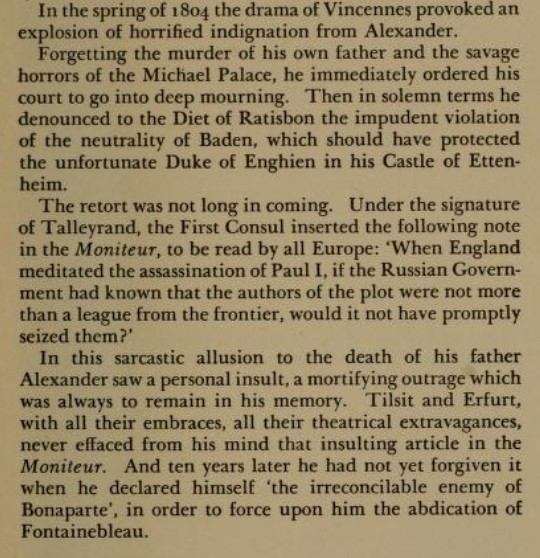
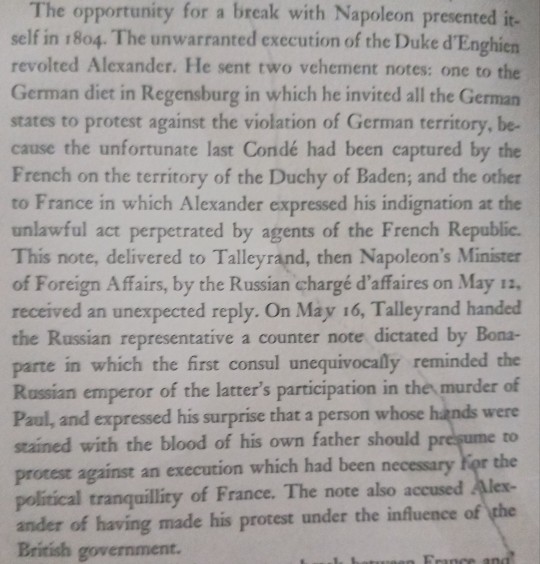
alexander going to sleep every night at erfurt knowing the guy he spent the entire day chatting and laughing with is the same guy who said that about his father's death
52 notes
·
View notes
Text
An apocryphe anecdote about Kléber and Eugène
Émile Marco de Saint-Hilaire (actually Marc-Emile Hilaire) was a journalist and novel-writer during the July monarchy who provided the public with a bunch of fake memoirs and other texts related to the napoleonic times, occasionally inspired by actual memoirs but usually simply inventing them himself.
One of these anecdotes takes place in Egypt, during the siege of Saint-Jean d’Acre:
All the arrangements for the siege of Saint-Jean d'Acre were made, it was said, with the thoughtlessness and carelessness that too much confidence in success always inspires. The trenches were barely three feet deep, so that many soldiers were not sufficiently covered and fell victim to this lack of foresight on the part of the engineer commander.
One morning when General Kléber was walking through the lines of the camp with Eugène de Beauharnais, whom, as captain commanding the guides of the general-in-chief, some of these cavalrymen always had to escort, he was heard to express his dissatisfaction at the fact that the trenches were not pushed further forward and deeper.
- "Look, Blondin," he said to Eugène, "at your stepfather's funny trench; it only goes up to my knee."
This general loved Eugène as one loves a son. Eugène was barely nineteen years old, and by familiarly calling him "blondin", Kléber was alluding to his magnificent hair; but no sooner had he uttered these words, than a bullet fired from the accursed tower tore a part off his cuffed boot and broke the thigh of the guide who was standing next to him. With a movement as swift as lightning, the general threw himself in front of Eugène and stretched out his arms as if to protect him; then he turned his head towards the wounded man and said coldly to Eugène:
- "Well, Blondin, wasn't I right?"
This action, these words, this gesture of Kléber opposing his broad chest to the blows of the enemy to protect his young friend, are sublime; and it must be, because afterwards Prince Eugène could not recall this scene without tears coming to his eyes.
Of course Eugène would do that – except he does not recall this scene at all in his brief memoirs. In fact, there are several hints indicating that the whole anecdote is made up: Eugène’s age is wrong, he was not 19 but 17 during the siege of Saint-Jean d’Acre. Plus, he was not a capitaine at the time but a mere lowly lieutenant, also ADC to his stepfather and surely not commanding the guides (yet) – that was Bessières’s position. While it is not completely impossible that Napoleon would have given his stepson an escort (to avoid death by strangulation if on returning home he had to inform Josephine of her son’s demise), I doubt that was the case. Eugène’s job mostly consisted of taking orders to Napoleon’s subordinate commanders, and there is no indication that he received special protection at similar occasions. In fact, Eugène had already been wounded in action during the first attack of the siege. I’ve also never heard Eugène being called blondin before (a nickname that I do have read in some books was chérubin but I am at a loss as to the original source).
Finally, while Eugène does talk quite a bit about general Kléber and his alleged rivalry with general Bonaparte, he does not mention having been particularly close to Kléber himself.
Still, it is a nice story. And I particularly love the idea that yet another general from the former Armée du Nord/Sambre-et-Meuse was rivalling with general Bonaparte about his stepson’s affection 😋.
13 notes
·
View notes
Text
💝

And here is the inked version of him
45 notes
·
View notes
Text
1783, Abbey of Masevaux:
Oh, MY, GOD...
"
Kleber's alleged affair with the last of the Masevaux abbesses (eighteen years his senior) and the adventures he had with several other canonesses have the scent of a Diderot scandal. They are based solely on the assertions of his friend and biographer Lubert d'Hericourt, who reports them with a saucy wink. "One can hardly doubt that he made a few incursions into the Lord's vineyard, and he laughed when he was told that he no doubt made some of these old ladies indulge in somewhat profane pleasures."
These libertines would be of little interest if they didn't take us to the very heart of Kleber's social approach. Disgusted by the arrogance and egotism of the aristocracy, he is nonetheless the obligator and purveyor of many a large family. His connections help him in his work.
DUDE... DUDE.... *dies laughing*
12 notes
·
View notes
Text
I have no source for this either. (Anecdotes sometimes take on a life of their own, so it might be a doublet of Ney's and Eugène's mustache stories?)
But in the original first sketch for David's "Sacre" painting, Murat indeed seems to wear a mustache. (And not much else.)

apparently napoleon hated murats mustache so much that he ordered it to be omitted from portraits. i think he was just a hater bc murats mustache looked fantastic
180 notes
·
View notes
Text
Thank you for this, @microcosme ! 💖
I'd come again across this very letter a while ago, too. Before, I had figured this paternal concern was related to the illustrious marriage projects Napoleon had in mind. But according to an article by André Gavoty, it's much more complicated and may refer to one Fanny du Villars, the cousin of Simon Bolivar.
The story is here, in a reply to an Ask from @joachimnapoleon about Eugène and Fouché - because according to Gavoty, Fouché was the driving force behind it all.
A very sweet letter from his stepfather
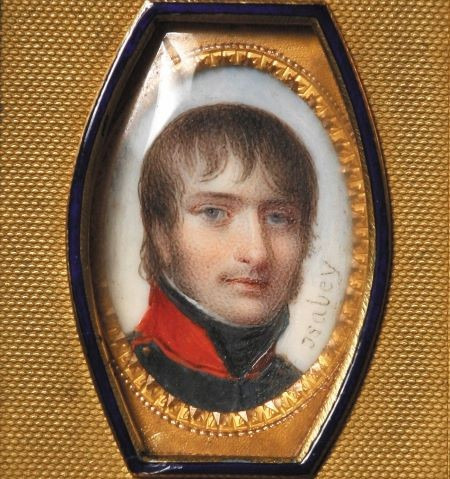
Saint-Cloud, 8 thermidor an XIII (27 juillet 1805).
Je suis instruit que vous avez des correspondances avec une nommée D—. Je ne sais pas si vous savez que cette femme n'est qu'une fille, une intrigante, dont la police s'est souvent servie. Une femme de cette espèce ne devrait pas recevoir de lettres de vous; c'est la boue de Paris. Je crois devoir vous en prévenir, que cela
vous serve de règle.
---translation by google and me---
I am informed that you have corresponded with someone named D—. I don't know whether you know that this woman is nothing but a girl, an intriguer, who has often been utilized by the police. A woman of this type should not receive letters from you; this is the scum of Paris. I believe I must warn you, this will serve you as a rule.
Napoléon adultère by Hector Fleischmann, 1909
BnF Gallica
29 notes
·
View notes
Text
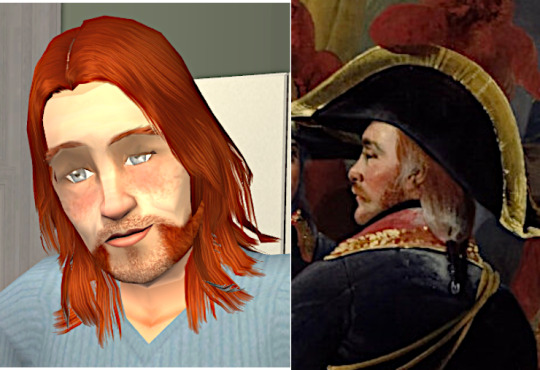
I can't help but think that my Sims 2-Ney is still very much stuck in his Hohenlinden phase...
17 notes
·
View notes
Text
No, he doesn't, actually. Michel Kerautret's book on him is only three years old.
Lavalette about the "divorce"
This is taken from "The Memoirs of Count Lavallette". An interesting remark (allegedly) made my Napoleon at the time when he finally decided to give Josephine the boot:
A few days before he had sent for me. He had been looking out for some friend of the empress, who might help to sweeten the bitter about to be presented to her. His choice fell on me. "The nation," he said, "has done so much for me, that I owe her the sacrifice of my dearest affections. Eugène is not young enough for me to keep him for my successor; nor am I old enough to give up all hopes of having children, and yet by Josephine I can have none. The tranquillity of France requires my choosing a new consort [...]"
Emphasis by me.
This statement, if true, would mean that the idea of Eugène suceeding Napoleon indeed had been around and had been seriously considered, at least by some people at court. But much more interesting to me is the reason why it can't happen, according to Napoleon: Eugène is too old.
Eugène, by the end of 1809, had only just turned 29. And with Naps being 40 and often enough in danger of being killed either in war or through assassination - would a successor old enough to immediately take over not have been advantageous?
But of course, Eugène also had been trained in the art of governing a country ever since he had been made viceroy of Italy (this fact was probably what made him look to some as the likely successor - he seemed as if Napoleon already prepared him for it). He was a grown man and, even if he usually in the end obeyed, he did have his own ideas.
Which was precisely the problem, in my opinion. A successor already old enough to develop his own political vision would have been somebody whose opinion an emperor might increasingly need to take into account. A newly born heir would not have any political ideas of his own for almost another two decades. Giving his father a lot more time to govern without the slightest considerations for anything but his own will.
This may have been the cause for Napoleon to call Eugène a "tête carrée" (blockhead, pigheaded) later on Saint Helena. Because Eugène indeed had dared to occasionally consider Napoleon's orders not quite perfect.
It's also why I feel like family life with the King of Rome might have turned much less idyllic very quickly, if Napoleon and his son had lived together until the latter reached puberty. Sooner or later, a Napoleon II would have decided he wanted to do some things differently than his father. And the opinion of the official crown prince could not have been brushed aside as easily as that of mere government officials.
28 notes
·
View notes

